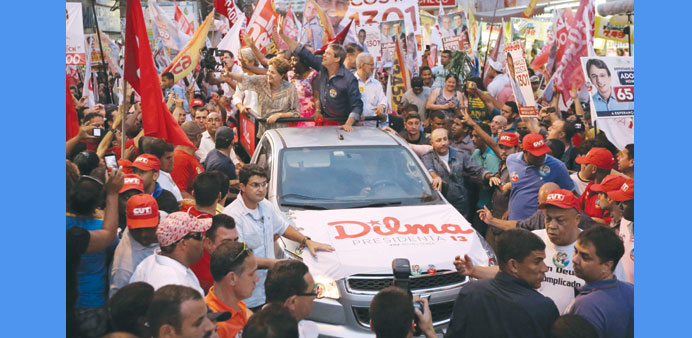Brazil’s President Dilma Rousseff (left) and Workers’ Party candidate for governor of Rio Lindberg Farias greet supporters during a campaign rally in Alcantara, Rio de Janeiro.
AFP/Rio de Janeiro
Brazil President Dilma Rousseff visited a Rio slum on Friday as latest polls showed her gaining ground against ecologist rival Marina Silva ahead of October 5 presidential elections.
Socialist Rousseff found a mixed welcome as she made her way through the massive Mare community, home to 130,000 people, near Rio de Janeiro’s International airport.
Some cheered, while a few threw stones at Rousseff’s car as she and Rio interim governor Luiz Fernando Pezao, of coalition partner the Brazilian Democratic Movement Party, inched their way through the crowds.
One woman complained that the government policy of using military occupation to combat violent crime and drug trafficking in the slums had failed, saying “the trafficking goes on and there are shootouts almost daily.”
Six years ago, during the second term of Rousseff’s predecessor Luiz Inacio Lula da Silva, police began moving into dozens of crime-ridden Rio slums known as favelas in a bid to “pacify” them and weed out drug trafficking gangs.
Last April, the army moved into Mare, and soldiers armed to the teeth were on hand as Rousseff arrived.
Rousseff arrived in Brazil’s former capital with latest polls showing her and Silva in a technical dead heat, with the president closing a recent gap after earlier predictions she would lose a run-off by up to 10%.
A Friday Ibope poll had Silva, the Socialist Party pick, 1% ahead for an October 26 run-off.
Earlier, Rousseff’s party slammed Silva - who served as environment minister under Lula - accusing her of defamation for saying she “cannot imagine people having faith in a party which appointed for 12 years a director (who) raided the coffers of Petrobras.”
The comment referred to a growing scandal over kickbacks from contracts for state oil giant Petrobras, after a former director of the company, now in custody, named dozens of politicians - most from Rousseff’s party - as involved.
Costa handed over the names as part of a plea bargaining bid.
Rousseff went to Mare for the signing of a document extending the 2,700-strong army presence there through December.

